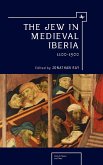The Jew in Medieval Iberia is an exploration of the richness and diversity of Jewish society in Christian Iberia from 1100-1500, providing a fresh look at the ways in which medieval Jews conceived of themselves and their communities, as well as their relationship to the surrounding society. The essays collected in this volume transcend older stereotypes of Christian persecution and Jewish piety to reveal a complex and vibrant community of merchants and scholars, townsmen and women, cultural intermediaries and guardians of religious tradition. Taken together, they present a portrait that adds greater nuances to our understanding of both medieval Jewish and medieval Spanish history.
Hinweis: Dieser Artikel kann nur an eine deutsche Lieferadresse ausgeliefert werden.
Hinweis: Dieser Artikel kann nur an eine deutsche Lieferadresse ausgeliefert werden.








